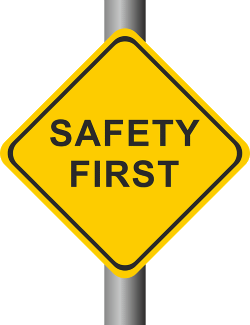Bad habits, everybody has them. Whether it’s convenience, laziness, security fatigue or just apathy, we all develop bad computing habits over the years, which could be detrimental to our security posture. Here are 7 of the most common security-related bad habits that can be the most harmful to your overall security:
 Is “password” your password? Maybe you got really clever and made it “password1”.
Is “password” your password? Maybe you got really clever and made it “password1”.
Guess what? A hacker will likely crack even your most brilliantly crafted simple password within seconds if it contains any dictionary words at all. Create a strong password that is long, complex, and random. Follow our cybersecurity tips on how to protect yourself online.
You should never reuse the same password across multiple websites because if it is cracked once, chances are it will be tried on other sites by the person who cracked it. Always use unique passwords for each site where you have an account.
If you didn’t purchase your annual antivirus update subscription (or move to a product that doesn’t charge for updates) then your system is going unprotected against the CURRENT batch of threats that are in the wild.
You should ALWAYS use the auto-update feature offered by your anti-malware solution and check it periodically to make sure that it’s actually working and receiving updates
Using out-of-the-box passwords for anything is usually not a good idea, especially when it comes to wireless networks. If you are using a default non-unique wireless network name then you may have increased the odds that your wireless network can be hacked.
Defaults settings are not always the most secure setting.
The default setting on pretty much anything is not necessarily the most secure setting, a lot of time, default settings are the most compatible but this does not equal the most secure.
A good example of this principle would be if you had an older router that had the default wireless security setting of WEP encryption. WEP was hacked many years ago and now WPA2 is the standard for newer routers. WPA2 may be an available option on older routers, but it may not have been default, because a manufacturer could have set it to what it thought was the most compatible of the technologies, which, at the time, may have been WEP or the first version of WPA.
Keep in mind that hackers may create free Wi-Fi hotspots to steal your passwords. You have to use a VPN when you are connected to public Wi-Fi to avoid hacking your devices.
Many people seem to throw common sense out the window when it comes to sharing personal information on social media sites such as Facebook. It’s become such a phenomena that we have given it its own term: “oversharing”. When does oversharing online become a security problem? Read more here
A lot of us probably haven’t checked our Facebook privacy settings to see what they are set to in many years. Everything you post could be set as shared with 'Public' and you might not even realize it until you review your Facebook privacy settings. You should revisit these settings periodically and use the tools that Facebook provides to secure content that you have posted in the past.
Facebook has a tool that allows you to change all your previously shared content and make it all “Friends Only” (or something more restrictive if you prefer).
We share our location a lot on social media without thinking twice. To avoid undesired consequences you should use VPN. It can help you hide your real location and stay safe online. With a Double VPN you can replace your location twice.
Author's Bio:Hannah Butler works as a content writer. Besides, she likes sharing her experience in the form of articles. In this case, she has her own section on https://writemypaper4me.co/. In the future she is going to start writing a blog in order to describe her working methods to others.